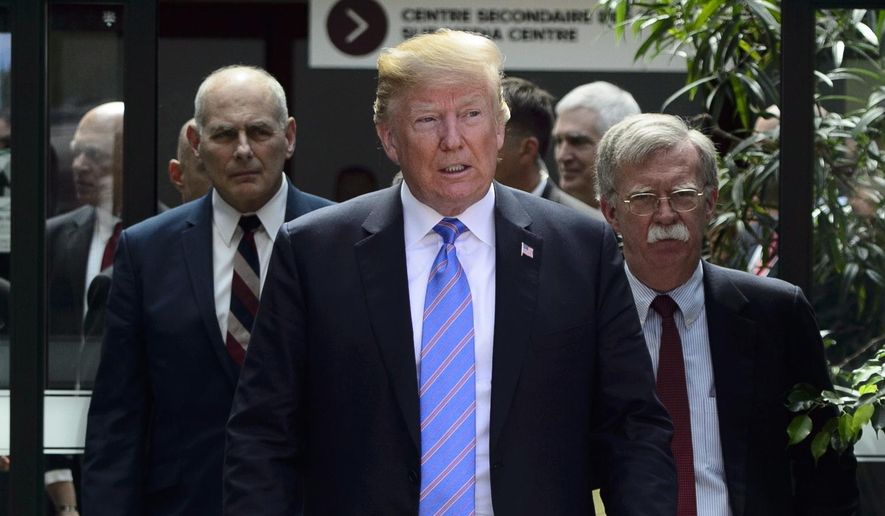WASHINGTON (AP) - Republicans in Congress are often hesitant to publicly criticize President Donald Trump, even when they have strong disagreements. And the reaction after his outbursts over the Group of Seven summit was not much different.
Trump badmouthed the prime minister of Canada. Abandoned a joint statement with longtime trading partners. And soured relations with top U.S. allies in one of the most startling outbursts ever at the typically diplomatic G-7 summit.
Yet Republican leadership in Congress said little. Senate Majority Leader Mitch McConnell declined public comment, as did House Speaker Paul Ryan. In fact, only a few Republicans said anything at all.
“There’s just some movies you don’t want to see again,” said Sen. Pat Roberts, R-Kan. “It was what it was.”
Sen. Mike Rounds, R-S.D., said he wanted to know what provoked Trump, saying the president doesn’t usually attack first, but is more of a counter-puncher. Still, he doesn’t like “that kind of language any time.”
“It’s better if we keep those kinds of comments and those arguments with friends, in private,” said Rounds.
That left the heavy mop-up mostly to others. The ailing Sen. John McCain, R-Ariz., rarely one to shy away from a fight, tweeted criticism directly aimed at Trump: “To our allies: bipartisan majorities of Americans remain pro-free trade, pro-globalization & supportive of alliances based on 70 years of shared values. Americans stand with you, even if our president doesn’t.”
Retiring Arizona Sen. Jeff Flake took issue with Trump’s trade adviser’s remark that there is a “special place in hell” for world leaders who cross the president. Flake tweeted: “Fellow Republicans, this is not who we are. This cannot be our party.”
Some Republicans say it is protocol not to criticize the commander in chief while he’s traveling abroad - especially now, as Trump begins the historic summit with North Korean leader Kim Jong Un in Singapore.
Others remain fearful of provoking Trump, worried they will become the subject of his presidential tweets. Many have said their overall strategy in dealing with the White House is to steer the administration toward shared goals.
But they are also coming to realize that on the trade issues that set Trump off at the G-7 - and led to his specific attack against Canadian Prime Minister Justin Trudeau over his country’s steep dairy tariffs - they might have irreconcilable differences with the Republican Party leader.
Sen. Lindsey Graham, R-S.C., said Trump won the presidency by tapping into a protectionist strain that’s increasingly popular in America, and around the globe, and it’s calling into question the GOP’s longstanding preference for free trade and open markets.
“I’m not sure a majority of Americans believe that globalization and free trade is in our interests,” Graham said on ABC. Graham said he and McCain still believe in trade, “but I’m not sure most Americans agree with John McCain and Lindsey Graham.”
Still, some senators are trying to push back. A group of Republicans is struggling this week with legislation from Sen. Bob Corker, R-Tenn., and Sen. Pat Toomey, R-Pa., to prevent Trump from imposing tariffs on steel and aluminum imports in the name of national security.
Trump called Toomey overnight Sunday from Singapore for a 20-minute conversation on trade.
Toomey said Monday that if the president intended to use the tariffs as leverage in trade talks - say, to reduce the Canadian tariffs on U.S. dairy imports - he’d be willing to consider them. But he told a local radio station that the president is using the tariffs “for the wrong ends.” They agreed to disagree.
But that doesn’t mean the legislation to halt the tariffs has much chance of passage in Congress. Republican leaders are reluctant to tack the tariff measure onto a must-pass defense bill, which includes pay raises for the troops, worried it would get bogged down.
“If you gave truth serum to the caucus, I would say it would be near unanimous that the substance of this amendment is something they would support,” Corker said of his proposal. “There are a number of people that obviously don’t want to counter the president. To me, we are a separate but equal branch.”
“I’m intellectually with him,” Graham said of Corker’s amendment. “I’m just not so sure we should cut the president’s legs out from under him right now.”
Many senators from both parties want Trump to focus on the trade imbalance with China rather than key U.S. allies. Legislation that would reverse Trump’s decision to lift sanctions on the Chinese firm ZTE gained momentum Monday when it was added to the defense bill.
Democrats are eager to fill the void in pushing back against Trump.
Senate Minority Leader Chuck Schumer, D-N.Y., criticized Trump’s call for Russia to rejoin the G-7.
And even though Schumer shares Trump’s concerns about the dairy tariffs that hit his upstate industry, he tweeted of the summit: “Are we executing Putin’s diplomatic and national security strategy or AMERICA’s diplomatic and national security strategy? After the last few days, it’s hard to tell.”
Julian E. Zelizer, a professor of history and public affairs at Princeton University, said lawmakers should not shy from exerting their views, even while the president is abroad.
“If the president decides to abandon norms and protocol in such a dramatic fashion, it is legitimate - and some would say an obligation - for members of Congress to say why they feel this is wrong or to disagree with the position,” Zelizer said. “These are serious alliances and this is a very serious moment in international relations.”
__
Follow Mascaro on Twitter at https://Twitter.com/LisaMascaro




Please read our comment policy before commenting.